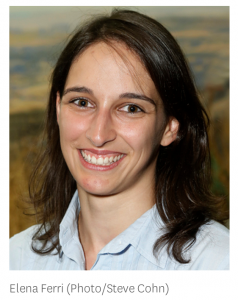Elena Ferri is a graduate student in the Chemistry department, and is advised by Charles McKenna. They are working on a potential health gain by inhibiting a particular protein. In 2012, she was awarded the Chateaubriand Fellowship, which supports Ph.D. students who want to do research in France. She shared her fellowship experiences with us.
AF: Tell me about this fellowship, I haven’t heard of it before.
EF: The Chateaubriand Fellowship pays Ph.D. student researchers a stipend to work on a research project in France. I only applied for the STEM fellowship, since I do chemistry. But they also have fellowships for humanities students. You don’t have to be an American citizen to receive it, but you must be enrolled in an American university.
AF: How did you hear about this fellowship?
EF: My lab collaborates with a lab at Institut de Biologie Structurale. We had a Partner University Fund (PUF), which is a small grant for fostering exchanges between French and American labs. The PUF grant is mostly meant for travel, training, teaching and other expenses that help to foster the research. Students who want to go on extended work trips to France are strongly encouraged by PUF officials to apply for a stipend through fellowships like the Chateaubriand.
AF: What was it like applying for that fellowship?
EF: It was pretty easy actually. The entire application is online. It requires letters of recommendation, transcripts, a short description of your French project, and a longer description of your project in general. They don’t require any detailed timeline for your project. The whole thing was pretty straightforward.
AF: Had you gotten any fellowships before this?
EF: No, actually. It was my first funding application. I applied in my second year, and this had really been the first time I had to write about my work. I was able to learn how to convince others of the worth of my research.
AF: Where did you get your reference letters from?
EF: My advisor here wrote one, of course. But since I was already collaborating with French researchers, they were able to write me letters of reference as well.
AF: Aside from the obvious (that traveling to France is amazing!), how did you personally benefit from the Chateaubriand fellowship?
EF: Given the nature of my project, it was impossible for me to make progress on the work I was doing at USC without the French lab finishing their part first. The project was very new, and we didn’t have a lot of researchers on the French side to do the work. Having the fellowship enabled me to go there and do the work to keep the project moving. It was the most productive time of my graduate work so far.




